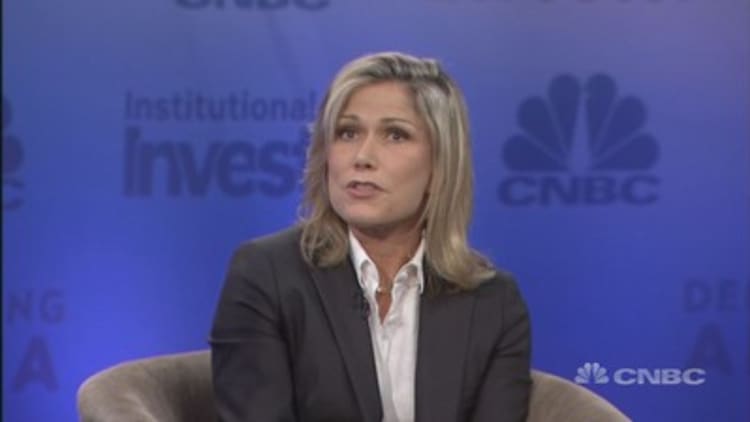If you're struggling to make money in your portfolio lately, you're in good company.
Hedge fund luminaries have not been knocking the cover off the ball either, with high-profile managers like David Einhorn and Bill Ackman losing more than 20 percent in 2015. Overall hedge fund performance has been lackluster so far this year, too.
However, there is a part of the industry that is quietly killing it — it's not the "Masters of the Universe" — it's the machines. Computer-driven or "systematic" strategies (also called Commodity Trading Advisers or CTAs) are beating the humans.
Data from Hedge Fund Research shows systematic managers are up 5.6 percent through February. That's compared with a 2 percent drop for the firm's index of hedge funds overall. The Societe Generale index of CTAs is up even more with a gain of 7.3 percent through February.
So, what is working for the machines that the humans are missing? According to the oft-called "most powerful woman in hedge funds," Leda Braga of Systematica investments, the machines have the edge when betting on stocks going down.
"Going short is hard for discretionary traders. It just is," Braga said via email. "Perhaps it is human nature that we all prefer to find things we like and buy them than to find things we don't and bet against them. A systematic model has no emotion, so CTAs take short positions very competently."
While she may not be getting emotional, Braga must be feeling pretty good about her year. Amid all the headlines of hedge fund closures and poor performance, Systematica has grown from $7.9 billion in outside capital when the firm launched in January 2015 to assets now north of $10 billion. Helping to attract investors is her performance, with her flagship fund up 9.8 percent this year and 3.4 percent last year.
Funds such as Systematica make money by identifying trends across stocks, bonds, currencies and commodities. A big trend that Braga credits for outperformance this year is her bet to go long bonds.
"No discretionary trader wants to run that position," Braga said. "They missed on it in 2014, too, whereas we capitalized in full on it. We can do it because we operate in a more diversified manner, so it is OK to be contrarian. When you only hold a handful of positions, it is harder to go against consensus."
The fund also benefited from bets against energy and stocks. In March, as the markets have rallied some performance was given back and the model adjusted accordingly. In fact, the fund has reduced risk and already started to get long in some equity markets.
The outperformance of systematic funds is attracting money to the computer-driven approach. A recent report from Barclays shows hedge fund investors have increased their allocation to computer-driven strategies to 11 percent from 7 percent. And as Systematica has grown assets, the firm's former parent company, Michael Platt's BlueCrest, opted to shut down to investors other than its partners. It returned billions of dollars to outside investors in December.
And it looks as if the money may keep flowing to the machines. According to a recent report from Preqin, CTAs are expected to attract some of the biggest inflows from hedge fund investors in 2016.
Fund marketer and consultant Don Steinbrugge of Agecroft Partners said he's "seeing a significant pickup in demand because a lot of people are worried about capital markets right now and looking to diversify, and CTAs have done well recently."

Of course, the key question is whether the machines will continue to outperform. As they say, past performance is no guarantee of future results, and systematic strategies have had lumpy performance in recent years. According to Stephen Weiss of Short Hills Capital, "CTA/systematic strategies require very specific inputs for them to be successful such as the recent high volatility in the market. When the inputs built into their models become ineffective, they will underperform."
And that's where the quant faithful reiterate their deep-seated belief in the superior intelligence of the data. Braga responds, "Trend following went through a tough patch of about three years. The world has moved on since and we have gotten better at what we do. I often say that we have gone through a three-year diet and we have exercised, too, so we are fitter than ever."
Roy Niederhoffer of R.G. Niederhoffer Capital Management, a quant fund that's up 16 percent this year, would also tell you that the key is to stick to your knitting through the ups and the downs. As he said recently on the Halftime Report "We follow the systems. That's the point. A quantitative strategy needs to take the emotion out of it and that's the value of using a system and not your emotion. I've learned to follow my model because it's a lot better than I am."
C-3PO couldn't have said it better.
Clarification: This story was updated to clarify that BlueCrest still invests for its partners but not for outside investors.



